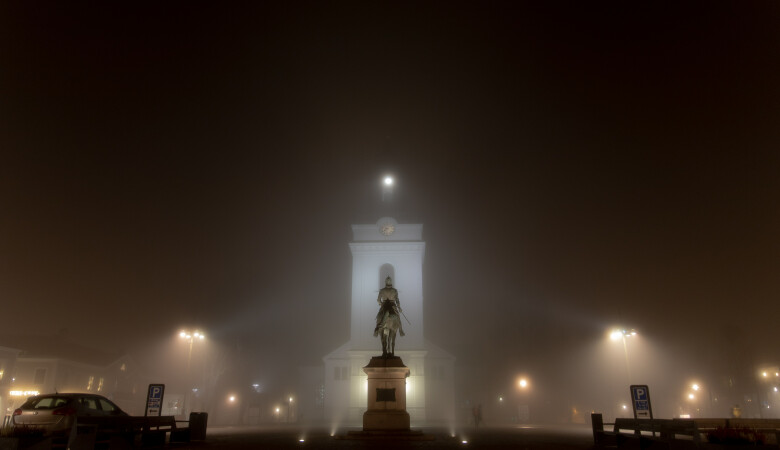Rejoicing in the Hope of the Glory of God (Romans Sermon 26 of 120)
April 29, 2001 | Andy Davis
Romans 5:1-2
Glory of God
I. A Tale of Two Mountains and One Inexpressible Journey
If you would, turn in your Bibles to Romans 5, as we resume after a little break from this book. We've been through four chapters together and then looked at Psalms and Book of Daniel and now we're back to look at some more of Romans. And this morning we're going to be looking at Romans Chapter five verse one and two, rejoicing in the hope of the glory of God.
In the Summer of 1987, I was on a summer mission trip. A number of our students and our members are going to be going on summer outreaches and they're tremendous experiences, but this was one of the greatest experiences I ever had. I was in the country of Pakistan in the northwest frontier province, and I've never seen any terrain as beautiful as that terrain up there, the Karakoram mountains, world class mountains, some of the highest in the world second only to the Himalayas in height. Some of these peaks towering over 20,000 feet covered with snow year round, and we traveled on a road through the Karakoram Pass into the western, far western part of China along what used to be known as the Silk Road, and it was incredible and I'll never forget it. But the glory that I saw in God's creation there, the glory that just took my breath away and I can't describe it. The glory that is in those mountains is nothing compared to the glory of two mountains in Scripture and one inexpressible journey that I want to begin with today. The first is Mount Sinai.
The First Mountain: Sinai
And Moses went up on Mount Sinai and received the Old Covenant from God, but he spent some time up there with God, and in that time that he spent with God, it got to a point in their relationship where Moses just couldn't wait anymore and he said, "Show me your glory," "I can't wait anymore, I want to see Your glory. I want to see You as You really are." And the Lord said, "I will cause all my goodness to pass in front of you and I will proclaim my name, the Lord, in your presence. I will have mercy on whom I will have mercy and I will have compassion on whom I will have compassion." Those verses will come in later in Romans 9, but God doesn't just give this to anybody that's what He's saying. He said, "All right, I'll show you my glory."
But He said, "‘You cannot see my face, for no one may see Me and live. Then the Lord said, ‘There is a place near Me where you may stand on a rock and when My glory passes by, I will put you in a cleft in the rock and cover you with My hand until I have passed by, then I will remove My hand and you will see My back but My face must not be seen.’" And so he saw a portion, just a portion of the glory of God, and it transformed him so much that when he came off that mountain his face was radiating, there was a brilliance, a brightness, a shining aspect to his face, and the Jews were terrified and he had to put a veil across his face so that they could just be near him and be with him. That's the first mountain.
The Second Mountain: The Transfiguration
The second we studied recently. One day Jesus took with Him Peter, John, and James and led them up a high mountain by themselves and there He was transfigured before them. Now, some have said that Jesus is God Incognito. He laid His glory aside, He didn't look glorious, He looked like just any man, any Jewish man of His time. But for a brief moment in His ministry He took some of His glory back and He showed it to those three, specially chosen to go up that mountain by themselves. And it says in Mark chapter 9 He was transfigured before them, His clothes became dazzling white, whiter than anyone in the world could bleach them. There was a brilliance, a radiant shining aspect to Jesus but it was not His full brilliance. Do you know how we know that? Peter, John, and James survived, that's how we know.
So Jesus just turned the knob up a little bit and showed His radiance, His glory, and they were overwhelmed with terror and they hid themselves. Incredible experience. So those are the two mountains and one of the inexpressible journey. Well it's the apostle Paul and he describes it in 2 Corinthians chapter 12, and there he says, "I know a man in Christ who 14 years ago was caught up to the third heaven, whether it was in the body or out of the body I do not know but God knows, and I know that this man, whether in the body or apart from the body I do not know but God knows, was caught up to Paradise. He heard inexpressible things, things that man is not permitted to tell." Now that's amazing.
Inexpressible means you can't put it into words. "Things not permitted for a man to tell" means you're not permitted to try. Now, what is that? That's the glory of God. It's paradise. And it's still just a portion. And how do we know it's just a portion? Because he survives. "No man will see My face and live," said God. Do you know that everyone of you who are called by the name of Jesus Chris, you were created to bask in the glory of God for eternity, do you realize that? Do you realize that's what salvation is all about, is taking you from eternal darkness into the eternal presence of God, and He is glorious, and not only that, you can't survive that physically and so He's going to transform you so that you can see Him face to face.
II. Exulting in the Glory of God: Our Original Purpose and Final Destiny
He's going to give you a resurrection body, flesh and blood cannot inherit the kingdom of God. So He's going to give you a new body, He's going to give you a new soul, the whole thing so that you can see His glory. He's going to show it to you. And my purpose today is the same purpose of Romans 5:2, that you may exalt, that you may boast, that you may rejoice in the hope of the glory of God. Listen to Chapter 5:1-2 it says, "Therefore since we have been justified through faith, we have peace with God through our Lord Jesus Christ, through whom we have gained access by faith into this grace in which we now stand and we rejoice in the hope of the glory of God." According to the Westminster Shorter Catechism, you were created, the chief end of man is to glorify God, and to enjoy Him forever. You're created to glorify God and to enjoy Him, and I would say, specifically to enjoy His glory. You were created for that.
Now, it's been a while since we've looked at Romans, but Romans has taken us through a journey to understand where we've been. To refresh your memory, Romans 1:16-17 is a theme verse for the whole book. There Paul says, "I am not ashamed of the gospel because it is the power of God for the salvation of everyone who believes. First, for the Jew, then for the Gentile. For in the gospel, righteousness from God is revealed, the righteousness that is from faith to faith just as it is written, the just, or the righteous, will live by faith." So the gospel message is a powerful message that can take you on a journey. It can take you from being under the wrath of God, to being in the very presence of God, blameless and with great joy. What a powerful message is that. And so Paul from Chapter 1:18 through Chapter 3:20, describes the nature of that wrath of God. It describes the nature of the judgment that we were under. Romans 1:18 says, "The wrath of God is being revealed from heaven against all the godlessness and wickedness of men who suppress the truth by their wickedness."
It says in Chapter 2:5 that, "We by nature every day, are storing up wrath against ourselves for the day of God's wrath when His righteous judgement will be revealed." And so we're in a severe problem, all of us, both Jew and Gentile, every single solitary person on the face of the earth, is born apart from God, does not love God. Romans 3 says, "There is no one righteous, no not one. There is no one who understands, no one who seeks God." We're all in danger, and we're under judgment. And then the glorious glowing center of the gospel in chapter 3, propitiation through faith in Jesus Christ. So what does that mean? That Jesus is our atoning sacrifice. He steps in our place, and absorbs the wrath of God, so that we don't have to. He takes away the wrath of God, so that we can have eternal life, so that we can see the glory of God and live, that we can survive judgment day. And He takes His righteousness and gives it to us like an asbestos robe we talked about, so that you can survive the fires, the flames of judgment day, and come through on the other side, and see God face to face.
And then in Romans chapter 4 it talks about faith. We are not justified, not declared righteous, we don't survive judgment day through any good works that we can do. It doesn't matter how much we serve the church. It doesn't matter how many good works we do. We can never use them to pay for sin. As I was saying to somebody recently, you remember those tests that you take and there are extra credit tests or questions? And if you get those, you can compensate for earlier questions you got wrong. There's no extra credit in the Christian life. There's nothing beyond what God intended for you to do. Can you do any better than to love God with all your heart, soul, mind, and strength, and love your neighbor as yourself? Is there any extra credit in the Christian life? And so we can never use good deeds to pay for sin. We need an atoning sacrifice. We need the blood of Jesus Christ, and it's available, but available only to those who trust.
To those who have Romans chapter 4, the faith of Abraham. And what was the faith of Abraham? You remember. This is just a review. God took Abraham out of his tent, and He pointed up to the stars. He said, "Look up at the stars, see them all." And he looked. And then God gave him a promise, "So shall your offspring be." Abraham believed God, and it was credited to him as righteousness. You hear a promise, you hear a message, you believe it, and you're saved just like that. But is it just like that? We can't see justification, can we? We don't get a certificate, do we? We don't get an angelic visitation. How do we know? That's what chapter 5 is about. It's about assurance. It's the way that we can know that we have received justification. And we're going to it over the next few weeks, unfold justification, so that we see what happens in the life of a truly justified person. God wants us to experience His glory. He wants us to be moved from under His wrath, all the way in the presence of His glory. And the gospel message is the only one that can take us there.
III. Immense Treasures Await Us: Justification by Faith and Total Assurance
Now as we look at chapter five, we see immense treasures awaiting us, justification by faith and total assurance. Now, Paul's intention here is that we would have a complete assurance of our salvation. He wants us to know that we're saved. And we're going to talk more about assurance over the next few weeks. He wants us to know. And this is necessary because we are wrestling, aren't we, all the time with our sin nature? We're struggling with sin. We're struggling with the world, the flesh, and the devil all the time. And there are times, we don't really know where we stand with God. And so Paul wants us to understand. Paul's goal here is to give you assurance, but to do it in such a way that God gets the glory for it. God gets the glory, and you get the joy. That's a good deal, isn't it? God gets the glory, you get the joy. And so we have to understand each of these treasures. And he brings out these treasures one by one, and we talked about them. Jesus said, "Every teacher of the law who's been instructed in the kingdom is like the owner of a storehouse who brings out of his storeroom new treasures as well as old." Come and look at this, and now look at this. And what about that? It's beautiful. And that's what we get in Romans 5.
IV. Unpacking the Treasures Jewel by Jewel
Now as we unpack these treasures, jewel by jewel, we'll start with the first one. Look what it says. "Therefore, since we have been justified through faith... " Just stop there. "We have been justified through faith." This means by way of review, we have been declared not guilty before the judgement seat of God. Is that valuable to you? Would it be of any value to you on judgement day to stand before him and have the judge bow to you and say, "He or she is not guilty in my sight." Is that valuable to you? How valuable? What could we use? Jesus said, "What does it profit a man to gain the whole world... " And we just know, it's worth more than a whole world to you to know that you can survive judgement day. And it says, "We have been justified by faith." Now, look at the verse says, "We have been justified." It's once for all times and the past. You don't get justified day after day. You don't wake up as a goal, "Today I'm going to be justified with God." You either have it or you don't. You receive it by faith and once you receive it, it can never, never be taken away. Once for all time. We have been justified, and we have been declared righteous simply through faith in Jesus Christ. Not through any achievements of our own. We have as I've said: Christ's asbestos robe of righteous covering us. And we are free from condemnation.
But what's the next part? We've already talked about that, that's fourth chapter. It says, "Since we have been justified through faith, we have peace with God through our Lord Jesus Christ." What an incredible gift is this? We have peace with God. Now previously, we were at war with God and God was at war with us. Now this might seem shocking to you, but it really is no good news to declare peace with God if there wasn't a conflict before. What's the good news? Suppose this morning, the Durham Herald had "Peace!" on the front page. Wouldn't you be kind of scratching your head and saying, "What is that? What do you mean peace?" But suppose it were May 1945, and that was on the headline. "Peace, peace in Europe, V-E Day," you'd know exactly what that meant, and you would rejoice, and you'd get on your knees and thank God that Hitler's been crushed and the war in Europe is over. We have peace. And how much more again in August of 1945 when V-J Day occurs? The war is totally over, now, it's done. We have peace. And now it means something, you see? Apart from a conflict, apart from the war, the peace means nothing. But there was a conflict and there was a war.
Look down in Romans 5:9: It says, "Since we have now been justified by His blood, how much more shall we be saved?" From what? From God's wrath. Again, God has an active aggressive wrath against sin. Now there is a teaching that says that we need to feel good about God, but He always loved us. They say He's always loved us, that He has no wrath against sin. They say He has no justice that needs to be addressed. They say that there's no problem on God's side. Do you know what you call that, or what I would call that, as a theologian? I'd call that liberalism. That's the essence of liberalism. The idea that God loves all the time and does not need to be appeased his wrath does not need to be addressed. But it's not biblical Christianity it sure isn't biblical Romans. Look, again, in Verse 9. "Since we have now been justified by His blood, how much more shall we be saved from God's wrath through Him?" Now read the next part. Verse 10: "For if when we were, [what?] God's enemies, we were reconciled through the death of his son. How much more having been reconciled shall we say through his life?" We were enemies with God and God was at war with us and we needed freedom we needed peace in our relationship with God. Furthermore Romans 8:7 says: "The sinful mind, the natural mind, is hostile to God." Another word of saying "hostilities," is war. There was a war going on. We were hostile to God.
Ephesians 2:3 says, "Like the rest we were by nature objects of wrath." Now stop and understand what we're saying. Have you ever looked at the sun through a filter? Like maybe it one of those times where there was an eclipse or something like that. You can't look straight at the sun. You learned that when you were three. If you look real hard at the sun you're going to be blinded for a period of time. The longer you look, the longer the blindness. The sun is brilliant and it is bright. Power of fusion churning out energy. Thousands and thousands of years. Who created the sun? God.
Do you know that when Abraham went out from his tent and looked up at those stars, he was seeing 1/40 millionth of the stars in our galaxy? The Milky Way, 1/40 millionth with the naked eye, that's what you can see. Our galaxy is 100 million light years across and 2,000 light years thick, and it's just one of a hundred billion galaxies in the universe. And the galaxies are made up of stars, most of them bigger than our sun, burning, burning, burning with the power of God. And God just scattered those stars, He knows each one of them by name. And this is the God who had an active wrath against us. What a terrifying thing is that. What a terrifying thing is the wrath of God. And how much should we desire to be out from under the wrath of God? And there is a way. And the way is the cross of Jesus Christ. Look what it says: "Since we have now been justified through faith…" What do we have? "We have peace with God through our Lord Jesus Christ." Peace! There was a war but it's over. God is at peace with us through Christ.
Now I want to make a clear division here or a distinction between the peace, peace with God and the peace of God. Philippians 4:6-7, says, "Do not be anxious about anything, but in everything, by prayer and petition, with thanksgiving, present your request to God and the peace of God which passes all understanding will guard your hearts and your minds in Christ Jesus." Do you know what I'm talking about? "Peace of God"? It means a sense of well being, freedom from anxiety, freedom from fear, a peaceful feeling, a sense that God loves you. Is that valuable? Yes it is. Is that what this is talking about? No, it isn't. This is talking about a status of peace with God. It's a new relationship and it's permanent because it's tied to justification. When you are justified by faith you now have peace with God and nothing can change that. Isn't that wonderful?
Now the two are related in this way. Martin Lloyd-Jones said, "You will never experience the peace of God until you have peace with God." But once you have peace with God, then you can many times in life as you pray and trust Him and obey Him and walk with Him, experience the peace of God in your life, peace with God. And what's the next things? We bring up the next struggle. Look at verse 2, "Through whom," Through whom? Through Jesus Christ. "We have also... " NIV leaves out the "also," I don't know why. Sometimes they just dispense these little words like they're not important. This is another thing. It's another treasure. This word "also." "We have also obtained our access," it says in NIV, "Our introduction by faith into this grace in which we now stand."
Now, we have already received it. It's past tense once for all, just like we have already received justification. We have already received access or better introduction. We've already received it once for all time. Now what is this? Well, in order to understand it, it's hard for us to understand because we're a very kind of egalitarian country, but if you lived in a country where there was an emperor or a monarch, you would understand what it means to be introduced into the presence of a king. Back in the year 1262 in a city in Uzbekistan, a Venetian trader named Marco Polo met up with some representatives of the Kublai Khan. Now the Kublai Khan was Genghis Khan's grandson, and he had set up a new capital city in Peking, what we now call Beijing. He set up a city there. And as the envoys from Kublai Khan talked to Marco Polo, the envoys said, "Kublai Khan would like to meet you. Come with us." And so, Marco Polo traveled that long distance from Uzbekistan all the way to Beijing/Peking, and he was introduced into the presence of the Kublai Khan. That's the same concept we have here.
But suppose Marco Polo had traveled alone and had found out where the palace was, had tried to run into the presence of the Kublai Khan, he's surrounded by 200 trained soldiers, what do you think would have happened to him, if he had tried to venture his way into the presence of the Kublai Khan? He would have been cut down before he even got into one of the antechambers. And how do we think we can just walk into the presence of God without an introduction? We must be introduced to God. And this verse says, "We have received our introduction." Through who? Through Jesus Christ. He has said, "Come and be with My Father." He's introduced us to God. It's what it says. 1 Peter 3:18, "For Christ died for sins once for all, the righteous for the unrighteous, to bring you to God." You see that? He brings you into the presence of God and says, "He's with me, she's with me. You're welcome here." And from then on you have freedom of access. You see? This is past tense once for all an introduction. You have now been introduced to God. From then on you have freedom of access anytime you choose.
Ephesians 2:18 says, "For through Christ, both Jews and Gentiles have access, Jewish and Gentile believers have access to the Father by one Spirit." Ephesians 3:12, "In Christ and through faith in Him, we may approach God with freedom and confidence." You have freedom of access. You can go right into the presence of God, but first, you needed your introduction and you've received it through Jesus Christ. You see how it works. And then Hebrews 4:16, "Because we have a tender and merciful, perfect high priest, Jesus Christ, let us therefore approach the throne of grace that we may receive grace and find mercy to help us in our time of need." Hebrews 10:22, "Let us draw near to God with a sincere heart and full assurance of faith." This is repeated access. We can go there any time. Oh, what a privilege. I've already been there several times today, right here. I've come into the presence of God and talked to Him, but only through Jesus Christ, only through Christ.
Well, but what does it say? We have received access or introduction to what? Into this grace in which we stand. Every phrase brings out a treasure. We are now, it says, standing in grace. It's kind of like we've transferred our countryship. We used to be part of an old country and now we're in a new country. We used to be under the law. There's two places that a human being can be, under law or under grace. They're only two. And if you're under law, you're under judgment, wrath and condemnation. If you're under grace, you're under freedom and forgiveness, and redemption, and relationship, reconciliation. There're two choices. And we have Colossians chapter one, "Been rescued from the dominion of darkness and brought over into the kingdom of the Son He loves." And so, we have received access by faith into this grace in which we now stand.
Now what is this standing of grace? The image I've had since I first started thinking about this, is of a hot, soothing shower. Yesterday, I chewed up more of my lawn with a back tiller. And I've used this as an illustration before, so I won't do the same old thing, but I'll tell you this, it got me dirty and hot and needing a shower. And I knew that I would need to stand up and preach in front of you clean and ready, you wouldn't like to see the grunge, so I had to stand under a hot shower. Do you know what I'm talking about? What that feels like when you just need that shower to cleanse you? That's the image I get of standing under grace. It's just pouring on us all the time and we need it. Don't we? If you say no, you don't know yourself and you don't know God. We need it all the time. Our pores, so to speak, keep putting out stuff and we need to be cleansed from it. And the grace is sufficient for it. "Where sin abounds, all the more grace is even more." You can't out sin grace. We're standing under grace all the time. Standing in grace. But the analogy falls apart as most analogies do because that's kind of an external cleansing. Actually, grace gets inside you and transforms you from within.
We stand by the power of God, and He's in us enabling us to stand. On your bulletin, I printed 2 Corinthians 1:21, Look at it. It's a beautiful verse. It says, "Now, it is God who makes both us and you stand firm in Christ." Is that not precious? You say, "How do I know I'll still be standing 20 years from now? How do I know that when I'm a senior citizen, I'm still going to be trusting in Jesus Christ? How do I know that the twists and turns of life are not going to pull me away from Jesus?" Now it is God who makes both us and you stand firm in Christ. He's not going to let you go. That's grace. Romans 14:4, "Who are you to judge someone else's servant? To his own master, he stands and falls, and he will stand, for God is able to make him stand." Isn't that beautiful? You're going to stand. You're going to survive. You're going to stand before Him Jude says, "Blameless and with great joy," He's going to do it. That's grace, to cleanse you from without and strengthen you from within. God's grace is working inside you at all times. 1 Corinthians 15:10, Paul says, "By the grace of God I am what I am. And His grace to me was not without effect. No. I worked harder than all of them yet, not I but the grace of God that was in me."
You see, grace makes you energetic. Grace enables you to put sin to death. Grace enables you to hate sin. Grace enables you to worship God. Grace enables you to read the Bible with understanding and to pray. That is the energy of grace. It's not like a warm June day when you're laying on a grassy hill, and the clouds are just floating by and you feel that gentle summer breeze. Have you ever felt that? That's so peaceful and gentle. It is not like that. It's more like the hurricane that took Elijah up to Heaven. It's powerful. It works its power in us, and it takes you to Heaven. That's what grace is, and we are standing in it. It says, "We have received access by faith into this grace in which we stand…" And now we're ready for the final goal and we rejoice, it says, "In the hope of the glory of God." Now, the word rejoice is a little weak. It actually means we exalt over it, we boast in it. I don't know if we're just at a point in our society where the only thing we exalt over or rejoice over is basketball championships.
Now, I've said to people I'm not going to stand up here and talk about earthly things, but what I'm saying is that the kind of thing that makes a fan go nuts and start cheering, it's wrapped up in this word. Or talked about it the next day at the coffee pot, it's boasting. You're talking about something you're exalting in. You're celebrating it. You see? That's what this word means. We exalt in, we boast over, we celebrate the hope of the glory of God. Now, what is hope? Well, hope... There's two types. There's Christian hope and then there's just the regular hope. The regular hope, we use that word all the time. Don't we? I hope it doesn't rain this afternoon, that kind of thing. Or, I hope it does. Some of you hope... If you were God, you're trying to decide 50% prayer for rain, 50% not. And what are you going to do? Both sunshine and rain, gifts from God. Take it all from Him. It's all evidence of His grace to us, but He's God and He decides what He's going to do. But you use that word, "I hope."
Now, I said I wasn't going to talk about worldly things, but I'm a Red Sox fan and so, here I go. There was a Sports Illustrated article about suffering Red Sox fans of which I'm one. And the name of the article was "Hoping for the Best, expecting the worst." That's the best example of worldly hope I've ever heard in my life. You're hoping that this year finally, win a championship. Never going to happen. I have a prophecy on that. Never going to happen. No I don't. Never going to happen. Alright? Hope for it though, that's worldly hope. Do you understand what I'm talking about? Then there's Christian hope. Now what is that? It's tied into the God of Daniel. We've already learned about Him. The God of Daniel who knows the future meticulously, accurately. Daniel 11, all these kings going here and there, and He's told you what's going to happen in the future. And He's going to make it happen, the Sovereign God. And He's told you, "In Christ you're going to Heaven." Now that's Christian hope. And what is it? It's a good thing that you look forward to and have not yet received. But you're waiting for it patiently. It says that in the Book of Romans. It says... Romans chapter 8, it says, where is it? I'm sorry. It says, "Hope that is seen is no hope at all, who hopes for what he already has? But if we hope for what we do not yet have, we wait for it patiently." So, you don't have it yet, but you're waiting for it.
Now, what is the glory of God? There's two different ways to understand that. I think they're both fair. We're rejoicing in the hope of seeing God's glory. We're going to get to see Him so long. We're going to get to see the brightness. What Moses could not survive seeing, what Peter, James and John saw only part of, what the Apostle Paul saw but couldn't describe and wasn't permitted to describe, we are going to see face to face. Wow. And you have never seen anything in this earth that compares with it. And therefore, for you whether you're young or old, if you're a Christian, the best things are yet to come. Isn't that great? A Christian is essentially a forward looking person. Even if they're lying on their death bed, they're forward looking. I can't wait to see God. I can't wait to see it. I want to be in His Presence. I want to live there forever. Okay, that's one aspect to the hope of the glory of God. The other is, "I want to be transformed by it." There is a glory that happens in us. It's not external to us. It actually changes us. Remember Moses's face shone because he was in the presence of God.
What do you think it's going to be like for you to be fully in the presence of God? It's going to radically transform you into his image, the perfection of God. And we rejoice in that hope. Someday I'm not going to be like this anymore. I'm not going to be like this. I'm not going to be a sinner. I'm not going be corrupt. I'm not going to struggle. My body's not going to fall apart. I'm going to be glorious, just like Jesus is glorious. And I rejoice in that hope. Do you rejoice in the hope of the glory of God? Are you holding on to these things today? Are these your treasures? Every phrase is yours. Take it home. It's yours free of charge through the blood of Jesus Christ. Every phrase is yours, justified by faith, declared not guilty of all your sins. Peace with God, peace with God. He said, "Peace with you." No wrath anymore. No fear of judgement day. And access or introduction into God's presence ultimately.
But introduction into this grace in which He makes us stand. And on top of it all, we rejoice. We keep looking ahead, keep looking forward, we're excited even if we're on a ventilator, laying on our death bed. We're looking forward, we're excited, we're looking ahead. Not looking wishfully back saying, "I've had a good life." Hey if you're a Christian, you've had a good life, but the best things are yet to come. The best is yet to come. Are you rejoicing in the hope of the glory of God? Now if you're an unbeliever, if you've never committed your life to Christ, you can't. You're still under the wrath and curse of God. In a moment you're going to have an opportunity to just bow your head and receive by faith, forgiveness of sins through Jesus Christ. If you're a Christian, I want to urge you to exalt in the hope of glory of God in your prayer life. When you get down on your knees, just say, "God thank you for what's yet to come. Thank you for the future that you have bought for me." And then when Satan starts hammering on you, and attacking you, criticizing you, say, "No. I'm justified and I'm going to heaven. And nothing, nothing can stop it."
Join with me on a prayer. Father, how can we give thanks to You sufficiently for what You have given us in these two small, short verses? God, You have declared us not guilty because of the blood of Jesus. He stood in our place and took away the penalty that we deserved. And we didn't do anything. We just received it by faith. Thank You so much for our justification. And thank You, oh Lord, that You are no longer at war with us. Oh what a fearsome thing. And though we felt it not, we couldn't perceive it oh Lord. It was still biblically true, that You were at war with us apart from Christ. But once we came into Christ, You're at peace with us. Oh thank You. And Father, I pray right now for any who have not trusted in You, any who have not repented and yielded to You, oh God, I pray that today would be for them the day of salvation. That they would bow before You. Father, I pray that they would come up to me and say, "I didn't know whether I was saved or not, I want to know Christ." Father, I pray they wouldn't leave this room without making that decision to trust Christ and to follow Him. And Father, for the rest of us, help us, Oh Lord, in our prayers and when attacked by Satan, that we might exalt, or rejoice, or boast in the of hope of the glory of God. It's Your Name, we pray Lord Jesus. Amen.






























